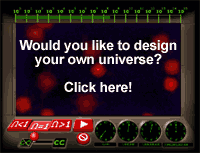The Expanding Universe
 "In some places in this article, you may be puzzled by the reasoning. The trouble is that physics is about math, and often translating the math into words is very long-winded. Since this is a short article, I have to say: trust me. Many of the things I've written about were really discovered by people working through the math, and finding something completely unexpected. That's why physics is so amazing - you seem to get out far more than you put in, and the reason is hidden deep in the fact that we can describe the world we observe with mathematical formulae."
"In some places in this article, you may be puzzled by the reasoning. The trouble is that physics is about math, and often translating the math into words is very long-winded. Since this is a short article, I have to say: trust me. Many of the things I've written about were really discovered by people working through the math, and finding something completely unexpected. That's why physics is so amazing - you seem to get out far more than you put in, and the reason is hidden deep in the fact that we can describe the world we observe with mathematical formulae."
Charles Jenkins
Schlumberger Research Scientist
The Big Bang
|
(c) 1996 STSCI Galaxies sprinkle the sky in this image obtained by the Hubble Space Telescope. The area of sky in this image could be covered by a dime held 75 feet away. |
You've probably heard that scientists think the Universe is expanding, and you've also probably heard that it began with a "Big Bang" about 10 billion years ago. For most of us, the descriptions we've read of this event produce images of a colossal explosion somewhere, with stars and galaxies flying out in all directions. But then we think, "If this Big Bang was the whole Universe, it can't have happened somewhere, because there isn't any extra anywhere for it to happen in!" At this point it usually feels easier to read a bit of science fiction.
Back to the Big Bang
The Universe is expanding. What does this mean? Are your ears gradually getting further apart? Fortunately no, even though your head is part of the Universe. Nearby, forces like the gravitational field of the Earth, or indeed our Galaxy, overcome the "universal" expansion. Only for things at least as isolated as galaxies themselves does the ever-increasing separation become obvious. A good image for this is to imagine what happens as you blow up a balloon with some stickers attached to the surface. All the stickers get further apart from each other, and incidentally to each sticker it appears that the others are receding symmetrically, the further ones faster. The stickers don't expand, and neither does your head.
 |
 |
Run this expansion backwards in time and you arrive at a moment when the distances between all objects were zero. That is the instant of the Big Bang. These everyday phrases have to be handled very carefully in this context! For example, you might want to say that, at the time of the Big Bang, everything was in one place. However it is possible (even likely) that the Universe was infinite even at the instant of the Big Bang. One way of seeing that this could happen is to remember from high school math that infinity times zero isn't necessarily zero (or infinity). If the distance between each point in the universe is zero, but there is an infinite number of points, the size of the Universe is, roughly, infinity times zero. This illustrates why it's a mistake to think of the Big Bang as happening "somewhere". It happened everywhere!


